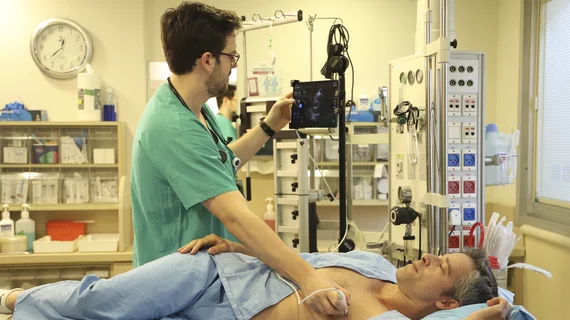FDA clears AI-powered POCUS platform for structural heart disease, heart failure
AISAP, an Israeli healthcare technology company focused on using artificial intelligence (AI) to enhance medical imaging results, has gained U.S. Food and Drug Administration (FDA) clearance for its new point-of-care ultrasound (POCUS) software platform, AISAP Cardio.
Cardio is a cloud-based platform that includes four modules for the computer-assist diagnosis (CADx) of valvular pathologies and eight key cardiac measurements. Its advanced AI algorithms can evaluate a patient’s left ventricle ejection fraction, right and left ventricular dimensions, right ventricular fractional area change, atrial areas, ascending aorta diameter and inferior vena cava diameter in addition to identifying aortic stenosis or mitral, tricuspid or aortic regurgitation.
The platform, trained on more than 24 million echocardiography clips, was designed to help even inexperienced users scan and diagnose a majority of common heart issues within minutes without leaving the patient’s side. In addition, it can communicate with equipment manufactured by a variety of vendors, directing data to a physician’s electronic health record or PACS system as needed.
“This milestone makes AISAP the first company in the world to secure FDA clearance in the CADx pathway for the comprehensive diagnosis of structural heart diseases using POCUS,” Ehud Raanani, MD, co-founder of AISAP and director of the Leviev Cardiovascular and Thoracic Center at Sheba Medical Center, said in a statement. “It marks a big step in our goal of delivering point-of-care assisted diagnosis, or POCAD, with unparalleled scalability and accessibility—from the largest academic centers to the most remote rural locations.”
“AISAP Cardio has the potential to be a game-changer in the world of point-of-care ultrasound,” added Smadar Kort, MD, system director of noninvasive cardiac imaging at Stony Brook Medicine, who has experience with the platform. “We know that structural heart disease and heart failure are the leading causes of hospitalization and morbidity in the U.S. Enabling a wide variety of qualified physicians to quickly and accurately diagnose these conditions at the bedside could lead to earlier detection and treatment, and better patient outcomes, as well as greater efficiencies and cost savings to health systems, while ultimately saving countless lives.”
AISAP plans to make the Cardio POCUS platform available in the U.S. market on Sept. 1.

